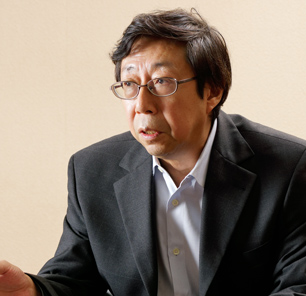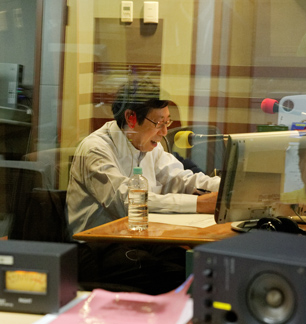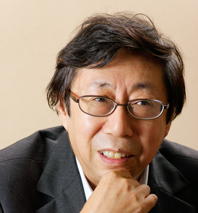Toshio Ohashi, Freelance announcer and radio personality
Mr. Ohashi's voice always touches the hearts of his listeners, whether it is through his delivery of the news, his soothing voice, or his tear-jerking narration.

Toshio Ohashi,
Freelance announcer and radio personality
Born in Osaka in 1952. Raised in Tokyo since the age of four, and graduated from Keio Senior High School and Keio University, Faculty of Economics. Joined Tokyo FM Broadcasting Co., Ltd. as an announcer in 1976. Left the company in 1995 and turned to freelancing. Today, has a successful career in radio broadcasting with Tokyo FM and JFN radio stations, and narrating for TV and commercials. Also teaches a reciting and narrating class. From 2007, narrates the automated train announcements for JR Hokkaido, which have become popular among residents of Hokkaido as well as tourists.
Finally becoming an announcer at a FM radio station after aspiring to be a cartoonist and editor
─ Mr. Toshio Ohashi used to work as an announcer for Tokyo FM and is now a successful freelance announcer and narrator. We can hear his voice on Tokyo FM’s “TFM News” as well as in “Daily Flyer”, a program broadcasted nationwide through 27 radio stations of JFN (Japan FM Network). In recent years, he also has been narrating automated train announcements for JR Hokkaido. His enchanting voice has attracted a lot of attention and has been distributed via ChakuUta® and other services. Though Mr. Ohashi’s predominant field is in radio, he also narrates for TV news, variety shows, and commercial messages. His voice is not only soft and easy on the ears, but also has a warmth that gives away his gentle personality.
What was the reason you sought to become an announcer?
When I was a student in Keio Senior High School, I wanted to become a cartoonist as I was really into Osamu Tezuka. After entering the Faculty of Economics at Keio University, a group of friends and I published a private magazine that fizzled out after the second issue, thereby ending my hopes of ever becoming a cartoonist. Still, I kept thinking about becoming an editor of a publishing company so that I could be involved with cartoons.
On the other hand, I was also attracted to recitation. I once participated in a type of spoken word contest for high school students, sending a tape recording of me reciting a poem of Tatsuji Miyoshi, and won first place. Drawing cartoons and reciting poems may seem like two completely different worlds, but both are the same in terms of self-expression. I always knew that I wanted to do work that involves expressing myself in some way.
When I started job hunting, I focused on publishing companies and announcer positions at radio stations. Fortunately or not, I was able to proceed to the final interview for Shogakukan (publishing company) and Tokyo FM, and I really had a hard time deciding which career path to take. The deciding factor was how much possibility there was for me to reach the job that I wanted. Even if I joined a publishing company as a new graduate, I may never be able to become an editor, but since I applied for an announcer position at the radio station, I was positive that I could do a job using my voice to express myself. Hence, I decided to take the final exam of Tokyo FM, passed it, and became an announcer.
─ What was it like when you first became an announcer at the radio station?
Basically, I was hired as a news bureau announcer, so right after joining the company, I learned the basics of news reporting and was trained intensively on reading the news.
My debut was in July, three months after I joined the company, not as a news announcer but as a DJ on an unscripted talk show titled “I am music.” Today, this title sounds really weird, doesn’t it?
─ You must have gotten really nervous since it was your first time to go on air, not to mention the fact that the show was unscripted.
Actually, not at all. I am always focused when I work, but I never get nervous; this has been the case throughout my career. People often ask me what the trick is for not getting nervous, but since I have never gotten nervous, I am unqualified to answer this question (laughs).
However, when I was still new to the job, I went through a lot of failures. I once read the news for the day before, and ended up having to write a letter of apology. The news agency had made the mistake of submitting the wrong script, but I should have noticed that it was for the day before.

─ Do you have any unforgettable episodes as an announcer?
One would be the Great Hanshin-Awaji Earthquake of 1995. When the earthquake happened, I was on air as the personality of a morning talk show. The initial report only told us that a major earthquake had hit the Kansai area, and we continued our regular broadcasting, but as we gradually learned of the magnitude of the devastation, we canceled the usual slots and became an emergency news show. By the way, this was my last show as a radio station announcer.
As for the Great East Japan Earthquake that hit in March 2011, on the day after the earthquake, I was appointed the announcing of a seven-hour special news show. Since it was a news show, I read the facts in a calm and reassuring manner, but when I read e-mails from the disaster victims, my voice would naturally fill with emotion trying to share their feelings with the listeners. I think this variation in the gravity of my voice is necessary for the announcer’s job to connect listeners with the frontline.
I have also done many variety-type shows, such as “Big Bang Tokyo” (April 1992-March 1995) in which I was the main personality, and narrating for a show called “Miyuki Nakajima, Give me a moment of your time” (April 1994- September 1997).
─ I heard that you are a big fan of Miyuki Nakajima.
Yes, that’s true. Ms. Nakajima is a marvelous singer. She encourages listeners with songs that fit perfectly with all kinds of moments in life. When I was handling the Monday shows of “DAY BREAK” (April 2007-March 2010), a JFN late-night radio show, I did almost everything on my own, from the selection of music to the radio talks. In addition to a mix of movie sound tracks and nostalgic oldies, I would always play Miyuki Nakajima’s songs. Naturally, as a fan, I would get enthusiastic about explaining the allure of the songs.
─ I also heard that other than broadcasting, you are also involved in recitation.
As I mentioned earlier, I won a recitation contest in high school, and still love it, maybe more than anything else. Some people may say that reciting and narrating are not interesting; for there’s a text or script, it’s the same no matter who reads it. This, however, is far from true. The perception of language varies greatly depending on the speaker. If the only point was to convey the meaning of words, a siri would do, but I think only the human voice can convey the slight nuances and feelings by taking little breaths and enveloping emotion.
For example, let’s take the following sentence: “A light is lit in a faraway town.” How far away is the town? Is it just somewhat far, or is it the town of a far off foreign country? And as for the lighting, are there a host of lights turning on at once, or is it a single light, all lonely and silent? These differences would affect how one expresses this sentence. What you convey changes significantly depending on your understanding and expression of a sentence.
─ What in particular do you focus on when reading aloud?
In my mind, I visualize the story I am reciting, and envision the pictures as I read along. If there is a sentence that says, “He opened the window and looked outside,” the words that I produce would change depending on whether I imagine the view outside after opening the window from the position of the character, or whether I imagine myself watching the character sticking his head out of the window from the outside. This may be a small difference, but this is my process.
Furthermore, in the future, I would like take up the challenge of using my body and expression to act out an one-man play.
─ Didn’t you have any worries about leaving the radio station and going freelance?
I had no worries about leaving. I was actually worried about continuing on as a salaried employee! If you remain an employee long enough, you move up to a management position at a certain age, which means more paperwork. When I was 42, I made the decision to go quit and go freelance in order to continue expressing myself as an announcer, and have never looked back! I plan on chatting away on air as long as I can keep going.
Unpopular courses such as ethics, psychology, logics and philosophy were Mr. Ohashi’s favorites

─ Please tell us about your memories at Keio.
I belonged to the Faculty of Economics, but I had no intention of joining a bank or trading company, therefore I didn’t even enroll in a seminar class. What interested me more than the lectures of economics were subjects such as ethics, psychology, logics, and philosophy, which were the liberal arts courses. These courses had a bad reputation among other student for their low passing rates, but I was kind of rebellious, so I took all of them. The most interesting course among them was logic. My principle is to be flexible and logical, and I think taking this course was an important disciplining opportunity for me to acquire the ability of logical thinking.
As for club activities, I belonged to a circle that planned overseas tours for students in partnership with a travel agency. I even planned a tour traveling Europe for a month. We decided to organize a luxurious trip and set up a deluxe plan that included stays at four-star hotels, riding the Orient Express, and even a night at Mon Saint-Michel, accompanied by a doctor from Keio University Hospital in case of sudden illness. Though expensive, the tour proved to be quite popular, maybe because those were the good days. I also got to join the tour with a planner’s discount and had a great time.
─ Didn’t you do anything to take advantage of winning the recitation contest in high school?
I was interested in expressing myself, so I participated in a drama group as an actor. Not the difficult dramas that were popular back then like Minoru Betsuyaku or Juro Kara, but original dramedies written by one of the members. We used to think, “Since we are getting paid, why don’t we put on something really exciting and fun?” We also performed at a large hall, and we were quite the hit. The really exciting thing was that we could feel the reaction of the audience right at the spot. I became even more enthused by the joy of expressing myself.
In order to speak in your own words, logic and flexibility are indispensable
─ I heard that you're good at reading tarot cards?
It was popular when I was a student, so I gave it a try back then, and I still do it today. I originally had a hobby of collecting rare playing cards, and from there, I also became interested in tarot cards. I thought that if I was going to do it, I might as well be good at it. Now that I have some confidence in my love readings, my daughter’s friends often come visit me for a session.
When I think about my days at Keio, I have more memories of my hobbies and having fun rather than studying (laughs), but such school days may have formed my underlying basis as an announcer, narrator, and reader.
─ Finally, could you please give a message to Keio University students?
I think everyone should acknowledge and cultivate their individuality that is specific to his/her. For example, at an employment exam to become an announcer, the closer you get to the final cut, the more individuality is required to shine through. It’s OK to improve your techniques at an announcing school, but in the end you are demanded to speak in your own words with a flexible mind and logical thinking. For instance, when a train is late, most people think, “was there an accident or some kind of trouble?” This is because they don’t think past the fact that the train is late. Maybe, there’s a new train timetable, or you might be standing on the wrong platform. Expanding your mind to numerous possibilities of “cause” helps develop a flexible intellect. By coming up with five or six reasons rather than just one, you can develop skills to view things from many aspects. I think this is important not only for announcers but for everyone.
─ Thank you very much.
*Position titles, etc., are those at the time of publishing.
